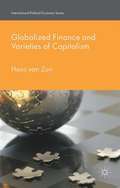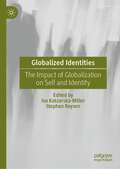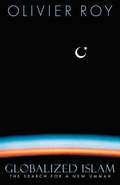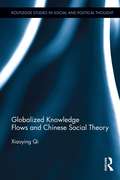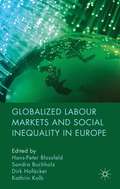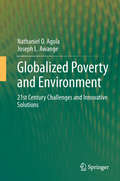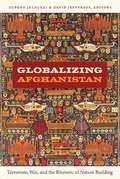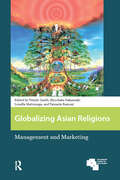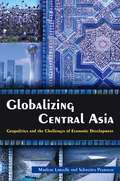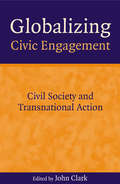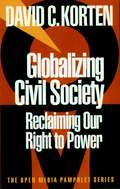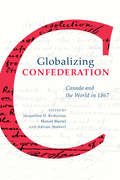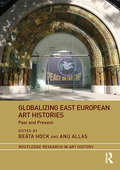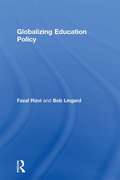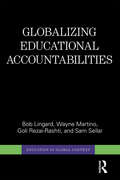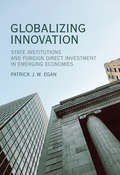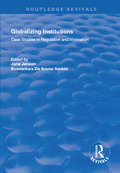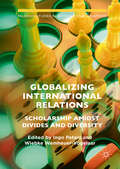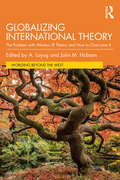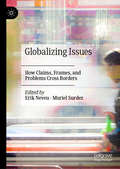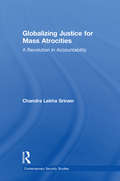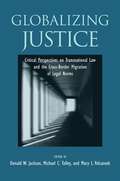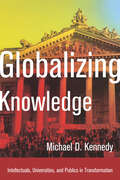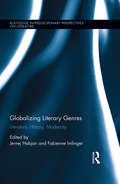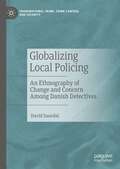- Table View
- List View
Globalized Finance and Varieties of Capitalism (International Political Economy Series)
by Hans ZonHans van Zon analyzes the financialization of developed capitalism, and argues that the emergence of finance as a dominant force has contributed to the relative decline of the West. He demonstrates that the neo-liberal model is inherently unstable and undermines capitalist economies, which can only function if they are embedded in institutions that are non- or even pre-capitalist. He shows how a toxic combination of financialization, corporate globalization, and a deregulated and parasitic financial industry have led to structural economic stagnation in both the USA and the greater part of the EU.
Globalized Identities: The Impact of Globalization on Self and Identity
by Iva Katzarska-Miller Stephen ReysenThis book explores the impact of globalization on self and identity from multidisciplinary perspectives. Chapters cover a variety of topics including the impact of cultural inertia on intergroup relations, global consumer identity, radicalization, evolving national identities, young people’s negotiations of different cultural identities, the emergence of all inclusive global identities, and the impact of global citizenship education on global identity. This collection will be of value to scholars and students from across the social sciences.
Globalized Islam: The Search for a New Ummah
by Olivier RoyCommentary on the Culture and its value.
Globalized Knowledge Flows and Chinese Social Theory: Globalized Knowledge Flows And Chinese Social Theory (Routledge Studies in Social and Political Thought #83)
by Xiaoying QiThis book considers the nature and possibilities of conceptual change and transformation under conditions of globalization, especially with regard to Chinese social and cultural concepts. It argues that the influence of globalization promotes the spread of West European and American social science concepts and methods at the expense of local concepts and approaches, and at the same time (paradoxically) provides opportunities for the incorporation of local concepts, including Chinese concepts, into Western or mainstream social science.
Globalized Labour Markets and Social Inequality in Europe
by Gosta Esping-Andersen Hans-Peter Blossfeld Sandra Buchholz Dirk Hof�cker Kathrin KolbBased on contributions from international experts, this volume provides an up-to-date account of globalization's influences on individual life courses in nine different modern societies, and of cross-nationally varying political strategies to mediate this influence.
Globalized Poverty and Environment
by Joseph L. Awange Nathaniel O. AgolaThis book reviews the key conceptions and economic theories of poverty, explains poverty-environment nexus, and finally offers innovative socio-economic and scientific geospatial solutions for the 21st Century. The book makes it possible for our readers to understand poverty thorough a concise review of the major theoretical economic frameworks, measures of poverty, and points out the need to understand rural-urban dichotomy of poverty. We find the theories and measures to be less-than perfect and therefore point out the need to treat these measures and theories as convenient tools lacking perfect accuracy and utmost scientific reliability. It follows then that the supposedly knowledgeably crafted poverty reduction and environmental preservation solutions are inherently imperfect. The economic solutions proposed in this book transcend extant humdrum macroeconomic and policy measures targeting poverty and environmental issues. We point to a new paradigm in which private sector and other stakeholders can create new and inclusive markets where value is co-created and shared. Above all, this book offers timely state-of-the-art geospatial solutions targeting the most pressing global problems of water, e. g. , the use of the Gravity Recovery and Climate Experiment (GRACE) missions to estimate changes in stored water in the water-poverty-environment nexus, pollution, agriculture and disaster management, where geospatial techniques are applied under strong environmental impact assessment regulatory regimes. This book provides a good summary of economic theories of poverty as well as a vivid depiction of the state of environmental degradation in the world. People often work separately on different issues that are, in fact, closely intertwined. The principle of holism is that the whole is greater than the sum of its parts, and I believe that this joint-venture of two experts on poverty and environment has produced something more than a sum of two separate monographs on the issues. Various points raised in this volume are worth heeding when we think of formulation and implementation of a truly effective post-MDGs development agenda. Yoichi Mine, Professor of Human Security and African Area Study, Graduate School of Global Studies, Doshisha University, Japan
Globalizing Afghanistan: Terrorism, War, and the Rhetoric of Nation Building
by Zubeda Jalalzai David JefferessGlobalizing Afghanistan offers a kaleidoscopic view of Afghanistan and the global networks of power, influence, and representation in which it is immersed. The military and nation-building interventions initiated by the United States in reaction to the events of September 11, 2001, are the background and motivation for this collection, but they are not the immediate subject of the essays. Seeking to understand the events of the past decade in a broad frame, the contributors draw on cultural and postcolonial approaches to provide new insights into this ongoing conflict. They focus on matters such as the implications of Afghanistan's lucrative opium trade, the links between the contemporary Taliban movement and major events in the Islamic world and Central Asia since the early twentieth century, and interactions between transnational feminist organizations and the Afghan women's movement. Several contributors address questions of representation. One looks at portrayals of Afghan women by the U. S. government and Western media and feminists. Another explores the surprisingly prominent role of Iranian filmmaking in the production of a global cinematic discourse about Afghanistan. A Pakistani journalist describes how coverage of Afghanistan by reporters working from Pakistan's Khyber-Pakhtoonkhwa (formerly the North West Frontier Province) has changed over the past decade. This rich panoply of perspectives on Afghanistan concludes with a reflection on how academics might produce meaningful alternative viewpoints on the exercise of American power abroad. Contributors. Gwen Bergner, Maliha Chishti, Cheshmak Farhoumand-Sims, Nigel C. Gibson, Zubeda Jalalzai, David Jefferess, Altaf Ullah Khan, Kamran Rastegar, Rodney J. Steward, Imre Szeman
Globalizing Asian Religions: Management and Marketing (Global Asia)
by Wendy Smith Hirochika Nakamaki Louella Matsunaga Tamasin RamsayThis book brings together the insights of theories of management and marketing to give an original view of the organizational dynamics of globalizing Asian New Religious Movements (NRMs) and established religions. Seventeen authors in this collection have recast their data on individual Asian religions and social movements to focus on the way these organizations are managed in an overseas or global context, by examining the structure, organizational culture, management style, leadership principles and marketing strategies of the religious movements they had hitherto studied from the perspective of the sociology of religion, or religious studies. The book examines strategies for global proselytization and outcomes in a variety of local ethnographic contexts, thus contributing to the scholarly work on the ‘glocalization’ of religions.
Globalizing Central Asia: Geopolitics and the Challenges of Economic Development
by Marlene Laruelle Sebastien PeyrouseIn this global era, Central Asia must be understood in both geo-economic and geopolitical terms. The region's natural resources compel the attention of rivalrous great powers and ambitious internal factions. The local regimes are caught between the need for international collaborations to valorize these riches and the need to maintain control over them in the interest of state sovereignty. Russia and China dominate the horizon, with other global players close behind; meanwhile, neighboring countries are fractious and unstable with real potential for contagion.This pathbreaking introduction to Central Asia in contemporary international economic and political context answers the needs of both academic and professional audiences and is suitable for course adoption.
Globalizing Civic Engagement: Civil Society and Transnational Action
by John D Clark'Informative and useful.' Development and Change Until recently, most civil society organizations (CSOs) operated at national or local levels. However, new global organizations and networks are increasingly emerging. This book examines what CSOs can achieve, and the barriers they face, when they break national boundaries and sectoral moulds and work with others in global networks. A series of case studies of CSO initiatives reveal how transnational action can yield impressive results in changing policies and public attitudes. The diverse range of CSOs studied includes consumer groups, trade unions, the anti-globalization protest movement, the World Social Forum, Jubilee 2000 and others. All reveal a remarkably similar array of practical challenges, from structure and leadership issues to governance dilemmas. The book offers practical guidance to those engaged with CSOs and contributes to academic enquiry about civil society.
Globalizing Civil Society: Reclaiming Our Right to Power (Open Media Series)
by David C. KortenPrompted by the 1998 United Nations Conference on Human Settlements, Korten's book indicts the world's governments for failing to address growing hunger, housing shortages, unemployment, poverty, human rights abuses, and environmental degradation. He examines the causes of this global crisis and offers fresh solutions reflecting sustainability, community, and equity--the only principles that can assure a healthy future for the world's people.
Globalizing Confederation: Canada and the World in 1867
by Marcel Martel Jacqueline Krikorian Adrian ShubertGlobalizing Confederation brings together original research from 17 scholars to provide an international perspective on Canada’s Confederation in 1867. In seeking to ascertain how others understood, constructed or considered the changes taking place in British North America, Globalizing Confederation unpacks a range of viewpoints, including those from foreign governments, British colonies, and Indigenous peoples. Exploring perspectives from the Austro-Hungarian Empire, France, Latin America, New Zealand, and the Vatican, among others, as well as considering the impact of Confederation on the rights of Indigenous peoples during this period, the contributors to this collection present how Canada’s Confederation captured the imaginations of people around the world in the 1860s. Globalizing Confederation reveals how some viewed the 1867 changes to Canada as part of a reorganization of the British Empire, while others contextualized it in the literature on colonization more broadly, while still others framed the event as part of a re-alignment or power shift among the Spanish, French and British empires. While many people showed interest in the Confederation debates, others, such as South Africa and the West Indies, expressed little interest in the establishment of Canada until it had profound effects on their corners of the global political landscape.
Globalizing East European Art Histories: Past and Present (Routledge Research in Art History)
by Beáta Hock Anu AllasThis edited collection reassesses East-Central European art by offering transnational perspectives on its regional or national histories, while also inserting the region into contemporary discussions of global issues. Both in popular imagination and, to some degree, scholarly literature, East-Central Europe is persistently imagined as a hermetically isolated cultural landscape. This book restores the diverse ways in which East-Central European art has always been entangled with actors and institutions in the wider world. The contributors engage with empirically anchored and theoretically argued case studies from historical periods representing notable junctures of globalization: the early modern period, the age of Empires, the time of socialist rule and the global Cold War, and the most recent decades of postsocialism understood as a global condition.
Globalizing Education Policy
by Fazal Rizvi Bob LingardRizvi and Lingard's account of the global politics of education is thoughtful, complex and compelling. It is the first really comprehensive discussion and analysis of global trends in education policy, their effects - structural and individual - and resistance to them. In the enormous body of writing on globalisation this book stands out and will become a basic text in education policy courses around the world. - Stephen J Ball, Karl Mannheim Professor of Sociology of Education, Institute of Education, University of London, UK In what ways have the processes of globalization reshaped the educational policy terrain? How might we analyse education policies located within this new terrain, which is at once local, national, regional and global? In Globalizing Education Policy, the authors explore the key global drivers of policy change in education, and suggest that these do not operate in the same way in all nation-states. They examine the transformative effects of globalization on the discursive terrain within which educational policies are developed and enacted, arguing that this terrain is increasingly informed by a range of neo-liberal precepts which have fundamentally changed the ways in which we think about educational governance. They also suggest that whilst in some countries these precepts are resisted, to some extent, they have nonetheless become hegemonic, and provide an overview of some critical issues in educational policy to which this hegemonic view of globalization has given rise, including: devolution and decentralization new forms of governance the balance between public and private funding of education access and equity and the education of girls curriculum particularly with respect to the teaching of English language and technology pedagogies and high stakes testing and the global trade in education. These issues are explored within the context of major shifts in global processes and ideological discourses currently being experienced, and negotiated by all countries. The book also provides an approach to education policy analysis in an age of globalization and will be of interest to those studying globalization and education policy across the social sciences.
Globalizing Educational Accountabilities (Education in Global Context)
by Bob Lingard Wayne Martino Goli Rezai-Rashti Sam SellarGlobalizing Educational Accountabilities analyzes the influence that international and national testing and accountability regimes have on educational policy reform efforts in schooling systems around the world. Tracing the evolution of those regimes, with an emphasis on the OECD’s PISA, it reveals the multiple effects of policy as numbers in countries with different types of government and different education systems. From the effect of Shanghai’s PISA success on nations trying to compete economically to the perverse effects of linking funding to performance targets in Australia, the analysis links testing and accountability to new modes of network governance, new spatialities, and the significance of data infrastructures. This highly illustrative text offers scholars and policy makers a critical policy sociology framework for doing education policy analysis today.
Globalizing Innovation: State Institutions and Foreign Direct Investment in Emerging Economies (The\mit Press Ser.)
by Patrick J.W. EganThe impact of host country institutions and policy on innovation by multinational firms in emerging economies.In the past, multinational firms have looked to developing countries as sources of raw materials, markets, or production efficiencies, but rarely as locations for innovation. Today, however, R&D facilities and other indicators of multinational-linked innovation are becoming more common in emerging economies. In this book, Patrick Egan investigates patterns of inward foreign direct investment (FDI) in developing countries, considering the impact of host country institutions and policy on the innovative activities undertaken by multinational firms. He examines the uneven spread of innovation-intensive foreign direct investment and emerging sectoral distributions, then develops a number of arguments about the determinants of multinational innovation in developing countries. Firms are attracted by a country's supply of skilled labor and are often eager to innovate close to new markets; but, Egan finds, host country institutions and the configuration of the host country's investment policies have a strong impact on firm decisions and evolving country investment profiles.Egan uses econometric analysis to identify determinants of multinational innovation, and examines differences among state institutions as a key variable. He then offers a detailed case study, assessing Ireland's attempts to use foreign direct investment in innovation as a catalyst for development. While FDI is a potential vehicle for industrial upgrading, Egan cautions, it is neither necessary nor sufficient for development. Furthermore, innovation-intensive investments are not likely to develop linkages with local actors or otherwise embed themselves in host economies in the absence of active, discriminating policies channeled through coherent and coordinated institutions.
Globalizing Institutions: Case Studies in Regulation and Innovation
by Jane Jenson Boaventura de SantosThis title was first published in 2000: The contributors to this fully documented volume address the debate surrounding the nature, impact and desirability of the complex set of phenomena collectively referred to as 'globalization'. The book breaks new ground by showing globalization in a wide range of areas, including national and transnational corporations, welfare policies, adoption, gendered politics and democratic institutions, citizenship, religion and judicial systems. It is also a truly international volume, including studies from North and South America, Africa and Europe. The book illustrates how globalization entails localization and is best explored through the analysis of institutions. It will be of particular interest to political scientists, sociologists, lawyers and anyone interested in the continual processes of global change.
Globalizing International Relations
by Ingo Peters Wiebke Wemheuer-VogelaarThis volumes engages with the 'Global(izing)International Relations' debate, which is marked by the emerging tensionsbetween the steadily increasing diversity and persisting dividing lines intoday's International Relations (IR) scholarship. Its international cast ofscholars draw together a diverse set of theoretical and methodologicalapproaches, and a multitude of case studies focusing on IR scholarship inAfrican and Muslim thought, as well as in countries such as China, Iran,Australia, Russia and Southeast Asian and Latin American regions. The followingquestions underpin this study: how is IR practiced beyond the West, and whichtheoretical alternatives are there for Western IR concepts? Fundamentally, whatdivides today's IR scholarship in light of its geo-epistemological diversity?This volume identifies shortcomings in the existing debate and offers newpathways for future research.
Globalizing International Theory: The Problem with Western IR Theory and How to Overcome It (Worlding Beyond the West)
by John M. Hobson A. LayugGlobalizing International Theory adds to the literature on non-Western international relations (IR) theory by probing the question of what it means to globalize international theory. The book starts with the premise that international theory is unfinished, incomplete, and homogenous because it provides a limited conception of the international which, in turn, derives from its partiality that reflects its narrow Western-centric bias. The contributors argue that the IR vision of the world is projected through a polarizing Western-filtered lens. Rather than utilizing an objective set of explanatory tools for explaining world politics, the reality is that orthodox IR theory only tells us why ‘the West is best’ and why ‘the Rest should become like the West’. This means that international theory is not truly international. In provincializing Western international theory, this volume navigates beyond the Eurocentric and imperial frontier of the prevailing limited conception of the international to explore the hidden contributions to international theory which can be found in the non-Western world. Bringing in excluded, non-Western conceptions of international theory highlights a broader conception of the international. The book provides a framework for theorizing globally, exploring the fundamental problems with Western IR theory, and how to overcome them. This book will be used by advanced undergraduate and postgraduate students, scholars, researchers, and IR theorists worldwide who are interested in non-Western IR theory. It will help navigate the problem of internationalness in the face of the grand theoretical problem of our time: the use and misuse of international theory in making sense of, and responding to, the complex global realities of the twenty-first century.
Globalizing Issues: How Claims, Frames, and Problems Cross Borders
by Erik Neveu Muriel SurdezThis book is an invitation to question conventional and often misleading visions of globalization. No problem is global by nature: issues are transformed by the action of claims-makers to become ‘problems’ debated in supra-national forums, triggering policy choices and policy transformations. Contributions highlight how health issues, environmental issues and/or political issues are framed as global by a set of stakeholders (scientific experts, bureaucrats, political parties or actors, social movements, social networks, firms). As the volume maps the social logic behind the globalization of problems, it also presents an opportunity for the very cross-disciplinary collaboration it calls for: researchers mobilizing the “agenda-setting” paradigm of issue globalization and those working within the “social constructionist” model are both represented here, providing a unique opportunity to examine the dynamics of globalization from the perspectives of (political, media, economic) sociology, international relations, social movement studies, and beyond.
Globalizing Justice for Mass Atrocities: A Revolution in Accountability (Contemporary Security Studies)
by Chandra Lekha SriramThis major new study examines the developing practice of universal jurisdiction, as well as the broader phenomenon of "globalizing" justice, and its ramifications. With a detailed overview of the contemporary practice of universal jurisdiction, it discerns three trends at work: pure universal jurisdiction, universal jurisdiction "plus", and non-use. It also argues that these disparities in practice should raise serious concerns as to the legitimacy and perceived legitimacy of such globalized justice. It then turns to a further consideration, that of globalized justice, precisely because it takes place far from the locus of the crime, and is therefore "externalized" and may fail to achieve many of its putative goals. In addition, this is a key assessment of civil accountability, through the use of the Alien Tort Claims Act in the United States. It details how the use of civil penalties may offer new avenues for redress, particularly with relation to group accountability, whether that of armed groups or of corporations. However, it balances this approach to accountability with recognition of certain flaws within externalized criminal accountability. This study also focuses on mixed tribunals, or other methods of internationalized justice as viable alternatives, which may avoid some of the problems with external justice, but are themselves far from perfect. Mixed or hybrid tribunals in East Timor and Sierra Leone represent different models of hybrid justice and provide the reader with excellent examples of these new forms of justice in action. This book will be of great interest to all students and scholars of human rights international law and political science.
Globalizing Justice: Critical Perspectives on Transnational Law and the Cross-Border Migration of Legal Norms (SUNY series in the Foundations of the Democratic State)
by Mary L. Volcansek Donald W. Jackson Michael C. TolleyGlobalization is a far-reaching and multifaceted phenomenon whose effects on law are just beginning to be appreciated fully. Globalizing Justice examines the effects of globalization on law and court systems in the developed and developing worlds. How has the global spread of legal norms changed the relationship between international, supranational, and national courts? How are transnational and international legal norms transmitted and received? The contributors utilize a variety of approaches—historical, comparative, normative, and empirical—to expose the extensive effects of globalization in areas such as human rights, universal criminal jurisdiction, citizenship, and national sovereignty. This volume sheds light on the global spread of information and the cross-border migration of legal ideas across the world to further open up the discussion of globalization in the social sciences.Donald W. Jackson is Herman Brown Professor of Political Science at Texas Christian University and the author of Even the Children of Strangers: Equality under the U.S. Constitution. Michael C. Tolley is Associate Professor of Political Science at Northeastern University and the coauthor (with Christopher J. Bosso and John H. Portz) of American Government: Conflict, Compromise, and Citizenship. Mary L. Volcansek is Professor of Political Science at Texas Christian University and the author of Constitutional Politics in Italy: The Constitutional Court.
Globalizing Knowledge: Intellectuals, Universities, and Publics in Transformation
by Michael D. KennedyHeralding a push for higher education to adopt a more global perspective, the term "globalizing knowledge" is today a popular catchphrase among academics and their circles. The complications and consequences of this desire for greater worldliness, however, are rarely considered critically. In this groundbreaking cultural-political sociology of knowledge and change, Michael D. Kennedy rearticulates questions, approaches, and case studies to clarify intellectuals' and institutions' responsibilities in a world defined by transformation and crisis. Globalizing Knowledge introduces the stakes of globalizing knowledge before examining how intellectuals and their institutions and networks shape and are shaped by globalization and world-historical events from 2001 through the uprisings of 2011–13. But Kennedy is not only concerned with elaborating how wisdom is maintained and transmitted, he also asks how we can recognize both interconnectedness and inequalities, and possibilities for more knowledgeable change within and beyond academic circles. Subsequent chapters are devoted to issues of public engagement, the importance of recognizing difference and the local's implication in the global, and the specific ways in which knowledge, images, and symbols are shared globally. Kennedy considers numerous case studies, from historical happenings in Poland, Kosova, Ukraine, and Afghanistan, to today's energy crisis, Pussy Riot, the Occupy Movement, and beyond, to illuminate how knowledge functions and might be used to affect good in the world.
Globalizing Literary Genres: Literature, History, Modernity (Routledge Interdisciplinary Perspectives on Literature)
by Jernej Habjan Fabienne ImlingerFocused on the relation between processes of globalization and literary genres, this volume intervenes in the prevalent notions of globalization, literary history, genre, and the novel. Using both close reading and world history, both literary criticism and political theory, the book is a timely intervention in the debates about world, postcolonial, and transnational literature as they have been intensified by critical globalization studies, world-systems analysis, Bourdieuan sociology, and cosmopolitanism studies. It contends that globalization, far from starting in recent decades, has a long and complex history, not unlike the history of literature itself, meaning that when we speak of globalization and literature, we in effect invoke the entire history of literature. Essays examine literary genres in relation to broader historical processes, connecting the present state of globalization to such key world-historic events as the early modern geographical and scientific explorations, the Enlightenment, the expansions of modernity in the long nineteenth and twentieth centuries, postmodernity and postcoloniality, and contemporary counter-hegemonic movements. The book offers innovative readings of the pastoral from Saint-Pierre to Carpentier; the novel in Kant and Wieland, and in Diderot and Marx; travel writing from Verne to Cortázar; sports writing in James and Kahn; entrelacement in Bolaño, Ghosh, and Soderbergh; and also the Mozambican ghost story, Indian genre fiction, "fake" autobiographies, Sephardic "language memoirs," the postcolonial Gothic, Irish "chick lit," and counter-hegemonic novels. Making important theoretical contributions to a renewed discussion about genre, especially genres of narrative fiction, this volume addresses global studies, the history of the novel, and debates over periodization and nationalism in literary history.
Globalizing Local Policing: An Ethnography of Change and Concern Among Danish Detectives (Transnational Crime, Crime Control and Security)
by David SausdalThe book examines 'the globalisation of local policing' through an ethnographic study of the Danish Police. Where many studies are looking into how larger inter- or transnational policing bodies and policies are changing the world of policing, few have gauged how local, public police forces are also globalizing. This book provides some unique insights into this under-researched process. Specifically, it describes the daily practices and perceptions of two Danish detective task forces, tasked with the investigation of organized property crimes committed by foreign nationals. In the book, readers get to see how the detectives think and work, including the many efforts they make in attuning their daily work to a more global reality. More so, readers get to see how the detectives fail and the many frustrations and concerns that such changes include. One the one hand, Danish detectives very much understand the need to de-localize and develop their work. On the other hand, they feel that many of these changes are in conflict with what they find to be real and rewarding police work. For people interested in contemporary issues of policing, the book thus points to a puzzling paradox. Globalisation might be making for more mobile and even mobilised local forces, more technologically driven and collaborating with international partners. However, these very processes are also making local officers feel more disarmed than ever. Ultimately, the book describes why that is, its consequences, as well as how to imagine a form of global policing more in tune with its local actors.
